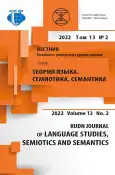Hypotyposis in Heterogeneous Screen Texts: Case Study of ASMR-Videos
- Authors: Evgrafova Y.A.1
-
Affiliations:
- Moscow Region State University
- Issue: Vol 13, No 2 (2022)
- Pages: 353-363
- Section: COGNITIVE RESEARCH
- URL: https://journal-vniispk.ru/2313-2299/article/view/323501
- DOI: https://doi.org/10.22363/2313-2299-2022-13-2-353-363
- ID: 323501
Cite item
Full Text
Abstract
This article examines the peculiarities of the functioning of the rhetorical figure hypotyposis in an atypical for its nature type of the text - a heterogeneous screen text. The relevance of the study is determined by the supremacy of such texts in modern communication and their increasing influence on the formation of public opinion, including the use of implicit manipulations, constructed by rhetorical means. The aim of this article is to examine means of constructing hypotyposis in heterogeneous screen texts. ASMR-videos published on the online platform YouTube were chosen as the research material. Descriptive techniques (observation; generalization; interpretation of observation results; classification; analysis; synthesis; comparison), contextual and distributive analysis, as well as functional-pragmatic analysis were chosen as the research methods. The following results were found in the course of the study. In heterogeneous screen texts, in particular ASMR-videos, the hypotyposis is constructed on the basis of metonymic and metaphorical connection arising between the verbal and non-verbal units in the course of their constellation in the screen “speech”. It is regulated by the analytical synaesthetic code, which has a number of subcodes: auditory-visual, visual-auditory, visual-tactile and visual-objective. The use of hypotyposis in ASMR screen texts “depicts” the invisible - the viewer-recipient experiences certain perceptual sensations from stimuli that do not really exist - a simulation of reality. Besides, a semiotic “nest doll” of codes allows to control the consciousness of the spectator-recipient, creating fascination. This article is aimed at students, graduate students, teachers, linguists, philologists, and anyone else interested in general and linguistic semiotics.
Keywords
About the authors
Yulia A. Evgrafova
Moscow Region State University
Author for correspondence.
Email: 212.155.04@mail.ru
ORCID iD: 0000-0002-4201-5281
PhD in Philological Sciences, Associate professor at the Department of Indo-European Languages
24 Very Voloshinoy ul., Mytyshi 141014, Moscow reg., Russian FederationReferences
- Barratt, E.L. & Davis, N.J. (2015). Autonomous Sensory Meridian Response (ASMR): a flowlike mental state. PeerJ, 3, e851. https://doi.org/10.7717/peerj.851PMID 25834771
- Vasil’cheva, A.V. (2019). Neologisms of the English language and ways of their transmission to the Russian-speaking recipients. In: Problems and trends in scientific research in the education system. Ufa: Omega science. (In Russ.).
- Zagidullina, M.V. (2019). Language as a “semiotic resource” in a competitive environment: the inevitability of transdisciplinarity in the study of modern communication. In: From differentiation of sciences to transdisciplinarity. Abakan: Khakass State University named after N.F. Katanov. (In Russ.).
- Zagidullina, M.V. (2019). Fire in the context of media aesthetics: ASMR imagery as a new communication trend. Horizons of civilization, 10, 143–155. (In Russ.).
- Zagidullina, M. (2019). Haptic mediaculture meets “DIY”-concept. In: Possible worlds of contemporary aesthetis: aesthetics between history, geography and media.
- Zagidullina, M.V. (2019). Haptics as a media aesthetic phenomenon. Media environment, 16, 130–134. (In Russ.).
- Lugovaya, N.V. (2019). Popular video formats (mukbang and ASMR) on YouTube as an effective tool for native promotion. In: Advertising and Public Relations: Traditions and Innovations. Rostov-on-Don: RSUPS-Expo. (In Russ.).
- Shapovalova, E.V. (2020). Communication of publishers’ brands in social networks: analysis of the model. Scientific notes of the vernadsky crimean federal university. Philological Sciences, 6(4), 213–224. (In Russ.).
- Mevlyutova, A.O. & Shevchuk-Chernogorodova, M.A. (2021). Genre and stylistic features of women’s video blogs. In: Convergent Technologies XXI: Variability, Combinatorics, Communication. Simferopol: Antiqua. (In Russ.).
- Zhirkov, A.V. (2011). Techniques of manipulative influence in advertising. In: Advertising discourse and advertising text. Moscow. (In Russ.).
- Laguta, N.V. & Mashkina, A.S. (2014). Techniques of manipulative influence in modern advertising text: on the material of banner and outdoor advertising in Blagoveshchensk. Vestnik of Amur State University. Series Humanities, 66, 22–26. (In Russ.).
- Tenekova, A.M. (2019). Rhetorical means of shaping the viewer’s interest in screen and interactive media (on the example of advertising eloquence). Current problems of screen and interactive media. Moscow. (In Russ.).
- Gribova, M. (2019). Spectator blindness and hypotyposis. In: Cinema and Capital. An Almanac of the Center for Economic Culture Research. Moscow: Saint-Petersburg: Institut ekonomicheskoj politiki im. E.T. Gajdara. рр. 432—444. (In Russ.).
- A relaxing scalp check & scalp treatment — gloves, glass pipette, scalp scratching and layering. URL: https://m.youtube.com/watch?v=tmhmKEhnIpA&t=1445s. (accessed: 12.06.2021).
Supplementary files









